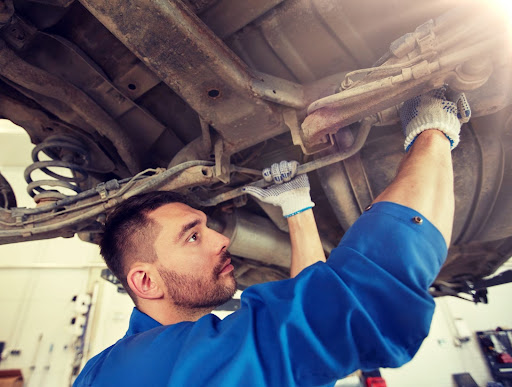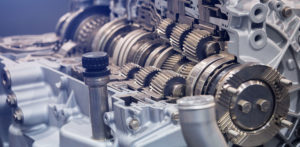Ultimate Guide to Auto Repair Services in Virginia

Your vehicle plays an important role in your everyday life. You count on it to run optimally and get you to your destinations. To do that, dozens of different parts and components all work together to operate a variety of different systems within your vehicle.
But, unfortunately, an occasional need for professional auto repair service to keep these systems running is an unavoidable part of vehicle ownership. Keeping up with preventative maintenance will help keep your vehicle running its best for longer and prevent the need for expensive auto repairs down the road.
Having a basic knowledge of automotive repair and maintenance services can help you address periodic repair needs with confidence, keep your vehicle running optimally for as long as possible, and prevent you from spending more time than necessary at the auto repair shop.
In this guide, we’ve covered everything you need to know about auto repair in Northern Virginia, including the most common auto repair services, how to know when auto service is needed, and how to find a good auto repair shop.
The Most Common Auto Repairs Mechanics See
Normal everyday driving naturally puts wear and tear on the main systems that keep your vehicle running and keep you and your passengers comfortable while on the road. These systems include the engine and the transmission, and the fuel, brake, electrical, suspension, and A/C systems. So, the most common auto repair services usually involve components within these systems.
Some of the most common services that an auto repair shop performs daily include:
- Brake repair
- Starting system repair
- Transmission repair
- Battery service or replacement
- Coolant system repair
- Suspension repair
- Spark plug replacement
When you have a reputable and professional auto repair shop like Hogan & Sons, the experienced mechanics will be able to properly address any automotive repair needs that your vehicle may have.
Indications That You Probably Need Auto Repair Service
One way to help treat your vehicle in the best way possible is to be aware of the warning signs that indicate you may need auto repair service in Virginia. By being aware of these red flags, you can help prevent minor issues from becoming more serious problems and save yourself money on the cost of repairs.
Possible signs that your vehicle needs service include:
- The check engine light is illuminated: The most obvious sign that something is wrong is when this light is on. A variety of problems can trigger this light, so it's important to take your vehicle to a professional auto repair shop for diagnostics ASAP.
- The vehicle won’t start: If you can’t get your vehicle to start, it could be due to a problem with the battery, starter, or ignition system.
- There is a significant reduction in power: If your vehicle is not accelerating as quickly as it usually does, or if it's struggling to drive up hills, there could be a problem with the engine or the transmission.
- Strange noises are coming from the vehicle: If you are hearing any unusual noises coming from your vehicle, such as knocking, rattling, squealing, or grinding, you should have it checked out as soon as you can. It could be a serious problem causing these noises.
- The vehicle is leaking fluids: If you see any oil, coolant, brake fluid, or anything else (besides water) leaking from your vehicle, it's important to have it addressed as soon as possible. Serious damage can be caused to your engine and other components if fluid levels get too low.
- Your vehicle is driving strangely: If the vehicle is hesitating, vibrating, or pulling when you drive, there could be an issue with the transmission, emission system, suspension, or brakes.
- The vehicle is going through fuel faster than usual: If you notice that your vehicle’s fuel efficiency has been significantly reduced, it could be an indication of a problem with the fuel system or engine.
If you notice any of the above, you need to have your vehicle inspected at an auto repair shop as soon as possible. Ignoring these warning signs can quickly lead to a need for more serious and expensive auto repairs.

How to Find a Good Auto Repair Shop in Virginia You Can Count On
If you need auto repair in Northern Virginia, you need to find a reputable shop that you can trust for high-quality auto service. To do this, you should:
- Ask local people you trust for recommendations, including family, friends, and co-workers. Word of mouth is one of the best ways to find a good auto repair shop.
- Look at the online reviews from people who have already used the shop you are considering.
- Look for a shop that has certifications from reputable organizations, especially the National Institute for Automotive Service Excellence (ASE).
- Get estimates from several different shops before making a decision.
- Ask about the shop's warranty coverage and any available payment options.
What to Expect at Your Appointment for Auto Repair
Once you've found a shop that you feel confident about, schedule an appointment for service. When scheduling the appointment or when you arrive, the first thing you can expect is for the mechanic to ask you about your vehicle's symptoms. They may also ask you about the maintenance history of the vehicle and your driving habits.
Once they have a pretty good idea of what is happening, the mechanic will then perform a diagnostic test to confirm. This often involves checking the vehicle's onboard computer, inspecting the engine, or taking it for a test drive.
After the problem has been confirmed, you’ll receive an estimate for the necessary auto repair as well as the estimated timeframe to complete it. You will then have the opportunity to approve the estimate before any work is done. Once approved, the mechanic will start the repair.
Tips for Getting the Best Possible Auto Repair Service
There are a couple of things you can do to help ensure that you get the best possible service from an auto repair shop and get your vehicle back on the road as soon as possible:
- Be prepared with plenty of information: Before you head to the shop, write down a list of your vehicle's symptoms, including any illuminated dashboard lights, odd sounds or smells (and exactly where they are coming from), and changes in the vehicle’s operation. Also, write down your driving habits and bring the vehicle’s previous service records. All of this info will help the mechanic thoroughly assess the situation and accurately diagnose the problem faster.
- Don’t be afraid to ask questions: The mechanics at the auto repair shop don't know how much you know about auto service or the terms they use. They would rather you ask all your questions than have a misunderstanding.
- Get everything in writing: Be sure to get the repair estimate in writing before any work is started. This protects you in the event of any problems with the repair after the fact.
By doing these things, you can be confident that you’ll get high-quality auto repair service that you can count on to keep your vehicle running at its best.

The Difference Between New, Remanufactured, and Salvaged Auto Parts
When you get an estimate for auto repair work, it is helpful to understand the different classifications of auto parts. The parts that you decide to go with may depend on your budget, their availability, and the warranty coverage. Here is a simple breakdown of each type:
New Parts (OEM)
These parts have never been used and are made either by the original equipment manufacturer (OEM) or an independent company to meet the original manufacturer's specifications. They will usually be the most expensive but are often covered under your vehicle’s warranty. Make sure you double-check your warranty info.
The general consensus from mechanics is that you should go with new parts if the vehicle is fairly new, or the replacement of a critical part is needed. But, if the replacement part that is needed normally has a short lifespan, aftermarket parts can also be a suitable choice, no matter how old the vehicle is. As long as you get aftermarket parts from a reputable vendor, they can be a good, more affordable alternative to OEM parts.
Remanufactured/Rebuilt Parts
These used parts have been restored back to good working condition. Usually, these parts are covered under warranty by the manufacturer, but the labor to install them will not be covered.
Salvaged Parts
These used parts have been pulled from another vehicle without modification and have no guarantee of reliability. But, in some cases, these parts may be the only option. If the part needed for your auto repair is very expensive when purchased new, going with a used part can be a smart choice. For example, when a catalytic converter replacement is needed, you may want to consider buying used.
A local, established auto parts shop is going to be your most reliable source for salvaged parts. They will have reasonable prices and may even offer warranty coverage on their used parts.
Always ask about the price, warranty, and return policy for parts. When dealing with a reputable vendor, their service staff can usually also provide helpful information on purchasing the parts your vehicle needs.
Additional Helpful Auto Repair/Maintenance Tips
There’s no dancing around it; a need for auto repair service will usually be a disruption to your routine, and it can be a stressful and anxiety-inducing situation. But, here are a few tips that can help make things easier and even help prevent repair needs in the first place:
- You may have seen self-serve kiosks that can scan your vehicle’s onboard computer for error codes. Don’t rely solely on these! A professional mechanic can read the code(s) and pinpoint exactly what the vehicle needs much better than a kiosk can. The last thing you want to do is spend money on parts only to find out they weren’t what was actually needed.
- Usually, when you get a list of recommended services/repairs from an auto repair shop, it will be in order of priority. Start at the top!
- Make sure to keep all paperwork after a repair and know where to find it later, in the event of a problem.
- Get professional advice before replacing a dead vehicle battery to ensure you get the right kind for your climate and driving needs. Costly electrical damage can happen if you put in the wrong type.
- Frequently towing heavy loads puts added stress on your vehicle. Ask your mechanic what type of oil will best keep your engine protected.
- Keep a tire gauge in your vehicle, and know how to use it. Ask them at your auto repair shop to show you if you need help.
- You may be surprised to learn that a clean/neat vehicle is easier to work on. Some parts of a vehicle are easier accessed from inside the cabin. So, before leaving your vehicle at the shop, remove any clutter from the floorboard and seats.
- Keeping the exterior of your vehicle clean is also important. If left too long, tree sap, bird droppings, salt air deposits, and mud can all cause significant damage. Regularly washing your vehicle will help prevent damaging effects in the long run .
- Periodically review your auto insurance policy’s coverage, deductible, and limits. It’s best to make any necessary changes before you need additional coverage for auto repair after an accident.

Why Routine Preventative Maintenance is So Critical
Keeping up with your vehicle manufacturer’s recommended preventative maintenance routine is vital to ensuring that you always have a well-running vehicle. This includes routine oil changes, tire rotations, alignment service (when needed), brake inspections and service, fluid level checks, and filter replacement (when needed).
It may seem like a significant investment in time and money up front, but staying on top of maintenance service will prevent bigger and much more expensive problems down the road that will surely keep your vehicle in the auto repair shop for much longer. Plus, your vehicle’s warranty can be voided by not following the manufacturer’s guidelines for maintenance.
You can also boost your vehicle’s resale or trade-in value by staying on top of the maintenance and keeping detailed service records.
How Often Maintenance Should Be Done on Your Vehicle
The first place to look for an exact breakdown of exactly when inspections and maintenance services should be done on your vehicle is the owner’s manual. Here, you’ll find the recommended service schedule to keep all of your vehicle’s critical systems running optimally.
Due to advancements in auto technology over the last several decades, the general rule of thumb for oil change service has changed. It has gone from every 3,000 miles to between 5,000 and 7,000 miles, depending on the type of oil and driving habits.
Along with routine oil changes and periodic tire rotation service, manufacturers also usually recommend inspection and replacement of certain parts when your vehicle hits 30,000, 60,000, and 90,000 miles. Again, make sure to check your vehicle’s owner’s manual for the recommended preventative maintenance schedule.
When you have an oil change service done at a professional auto repair shop, like Hogan & Sons, the mechanic will also perform an in-depth vehicle inspection. They will check filters, fluid levels, and other important components, as well as rotate the tires (if requested). The inspection includes an assessment of the following:
- Tires
- Fluid level check (windshield wiper fluid, power steering fluid, brake fluid, etc.)
- Brakes and parking brake
- Filters
- Battery
- Belts and hoses
- Undercarriage
- Suspension
- Horn and lights
- Windshield wiper blades
If any problems are detected during your inspection, you’ll get a written estimate of the service work that is needed. This is when you should take the opportunity to ask any questions that you may have before any repairs are started.
The Local Experts You Can Trust for High-Quality Auto Repair
The most important thing to keep in mind is to not ignore it if your vehicle is performing unusually. Bring your vehicle to your closest auto repair shop as soon as possible to prevent a small issue from quickly turning into a bigger, more expensive problem. But, keeping up with the suggested vehicle maintenance routine will help keep your vehicle running well for longer and reduce the need for auto repair service.
Start to build a working relationship with your mechanic. In doing so, they’ll get to know your vehicle and will have records of all of the service work that has been done. This is valuable information to have for any future repairs that may be needed. You’ll also build trust between you and the auto repair shop.
When you need reliable, high-quality maintenance and auto repair in Northern Virginia, you can count on our ASE-certified technicians here at Hogan & Sons. We proudly meet the needs of local drivers by providing reliable automotive repair, professional maintenance, and an unbeatable customer service experience, all at reasonable prices you can afford.


